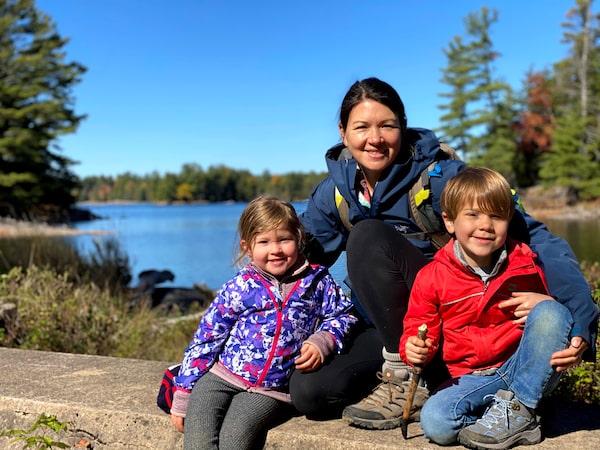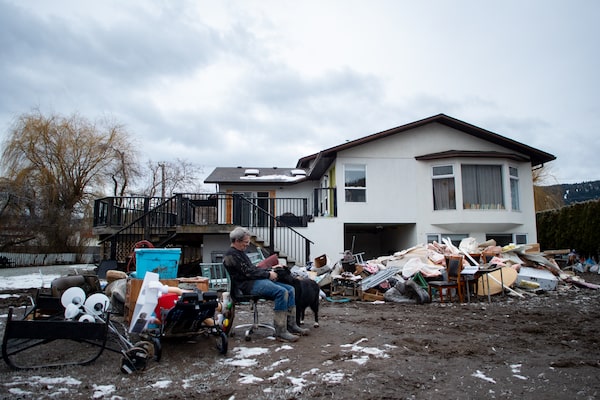If you’re reading this on the web or someone forwarded this e-mail newsletter to you, you can sign up for Globe Climate and all Globe newsletters here.
Good afternoon, and welcome to Globe Climate, a newsletter about climate change, environment and resources in Canada.
One of Canada’s most high-profile weather forecasters says the extreme storms that have pummelled parts of the country over the past month may be a sign of what lies ahead for the upcoming winter.
Weather Network chief meteorologist Chris Scott warned that we could sometimes feel “weather whiplash” this winter as temperatures and precipitation levels swing between extremes throughout the season. Yikes.
Now, let’s catch you up on other news.
Noteworthy reporting this week:
- The Trudeau government’s Speech from the Throne contains warning that ‘Earth is in danger’
- Can we stop Canada’s thawing permafrost from releasing huge volumes of greenhouse gases? The solution could be wild
- Could green energy be key to replacing the oil and gas workers who’ve vanished from Calgary’s core?
- From ROB Magazine: Maple Leaf Foods vowed to become the world’s most sustainable protein company. This is how their VP of sustainability plans to do it
- Photos from The Narwhal: A view of RCMP arrests of media, Indigenous land defenders on Wet’suwet’en territory
A deeper dive
Flooding in B.C. forces a new look at resilience of our food systems
While British Columbia prepares for more rain, farmers are concerned about what the predictions could mean for their livelihoods and our food systems. The flood that dumped a month’s worth of rain on to southern B.C. in less than two days created an agricultural disaster in the Fraser Valley, where the bulk of the province’s food production takes place. The photos tell a story of their own.
“We have third, fourth, fifth generation farmers there, and to know that your entire life, what your family has invested entire generations in, is completely submerged is very sad and surreal feeling,” said Andrea Woo on The Decibel podcast. She was on the ground in some of B.C.’s hardest hit agricultural heartland.
The flooding that has devastated so many farmers is putting on full display the weaknesses in Canada’s food systems, wrote Ann Hui, The Globe’s national food reporter. And, given the urgent warnings about climate change, it is only going to become even more vulnerable.
“The Fraser Valley is a region about an hour east of Vancouver, this also happens to be some of B.C.’s and some of Canada’s most significant agricultural land,” she said on the podcast. “It used to be a lake that was drained out in the 1920s in order to produce this very fertile land which is of course really great for growing things and for raising livestock and producing food, but of course as we’re seeing now, is also vulnerable to flooding.”
“Farmers, at least those I’ve spoken with, are really concerned about climate change,” said Hui. “But I’m hearing from some farmers they feel overwhelmed by the scope of the problem but also about what they can do to help with their own operation. In the summer it was the heat dome and drought, and now they’re facing flood, so quite literally the opposite.”
Hui also says that rebuilding farmland in B.C. could look very different to try to prevent future disasters.
Federal Agriculture Minister Marie-Claude Bibeau said Ottawa has pledged more than half a billion dollars in new programs focused on sustainable farming.
“Farmers have made great gains in sustainable agriculture,” she said, “but now is the time to double down to improve our resilience to the effects of climate change and reduce greenhouse gas emissions within the sector.”
Chris Bodnar has tried to make decisions based on the realities of farming on a floodplain in Abbotsford by growing diverse crops and planting strategically around his land.
“This is generationally defining in some ways,” he said. The choices made in the coming months – choices by governments, policy-makers and individual farmers on how to rebuild – must be made with resilience in mind.”
Opinion:
- Drowned animals in B.C. are a further facet of a flawed farming system
- Analysis: The province had been warned natural disasters would hit more often, and it was not prepared
Flood waters surround a farm in Abbotsford, B.C., Tuesday, November 23, 2021.JONATHAN HAYWARD/The Canadian Press
What else you missed
- East Coast communities grapple with effects of Atlantic storm that flooded roadways and knocked out power
- Coalition of environmental groups threatens to sue Alberta Premier Jason Kenney over inquiry remarks
- Astrophysicist Amita Kuttner chosen as interim leader of Green Party of Canada
- Vancouver Mayor Kennedy Stewart wants a climate levy in the city’s 2022 budget
- Extreme wildfire weather increasing around the globe, research suggests
- Australia’s Barrier Reef erupts in colour as corals spawn
Opinion and analysis
Gary Mason: Canada’s climate reckoning is upon us. The costs of ignoring the warnings will be enormous
Ana Ramos: When plastics go bio - The good, the bad, and the not-so-terrible alternatives
Green Investing
Bruce Power’s nuclear bond issue raises a question: What is green?
Bruce Power, which runs Ontario’s biggest nuclear power plant, issued $500-million in green bonds to finance the extension of the life of its units and to increase output. Its backers say it is the first use of the environmentally focused securities to fund nuclear power. The real benefit is that the bonds get the necessary certification to include institutional investors with specific environmental requirements in their portfolios.
But, as Jeffrey Jones writes, from an emissions standpoint, nuclear power plants are good for the environment. But regarding waste, there’s risk. It raises questions about whether green finance is properly named?
Also read:
- Company valuations and climate strategies are poles apart
- Many climate activists support Biden’s move to tap oil reserve
- Explosion in demand for sustainable finance talent shows no signs of slowing
- Investor newsletter: The difference between a good and great investor. Plus, is it time to give up on Algonquin Power?
Can green investing save the planet? A new newsletter course from The Globe explores climate-conscious investing. Sign up today.
Making waves
Each week The Globe will profile a Canadian making a difference. This week we’re highlighting the work of Rachael Newton, helping make menstruation products more eco-friendly.

Rachael Newton — 41 years old, mum of two, and founder of menstrual care brand nixit.Handout
I’m Rachael Newton — 41 years old, mum of two, and founder of menstrual care brand nixit, based out of Toronto/Tkaronto!
Nixit came to life after my family began reducing our household waste. When I looked into the period products I was using, I couldn’t believe I would use 11,000 tampons in my lifetime and that they would be biodegrading for 500 years! I found the menstrual cups on the market daunting and set out to create something simpler and better for the planet than single-use products. We’ve created a reusable, one-size-fits-all, suction-free menstrual cup that lasts five years without wrappers or applicators and is made in Canada.
Since 2019, we’ve diverted three million pounds of period product waste from landfills and are helping menstruators reduce waste by 99 per cent. I truly believe small changes incite big impact. Nixit empowers people to become more informed about their periods, and their cycle’s impact on the environment.
- Rachael
Do you know an engaged individual? Someone who represents the real engines pursuing change in the country? Email us at GlobeClimate@globeandmail.com to tell us about them.
Photo of the week

Nancy MacDonald and Artur Gajda tour the town of Merritt on November 24th, 2021. They are in phase one of residents returning to their homes are devastating flooding in southern B.C.Artur Gajda/The Globe and Mail
Catch up on Globe Climate
- How are B.C.’s string of natural disasters connected?
- A deal was reached, but was COP26 a success?
- Five things to take away from the first week of COP26
- Here’s how to keep up with our COP26 coverage
We want to hear from you. Email us: GlobeClimate@globeandmail.com. Do you know someone who needs this newsletter? Send them to our Newsletters page.
 Sierra Bein
Sierra Bein